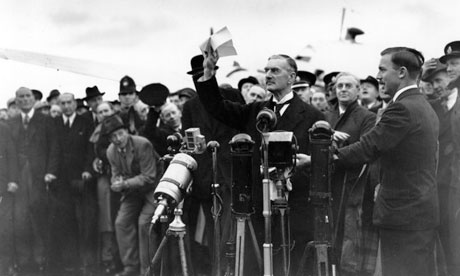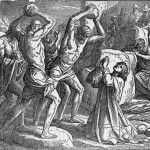Posts Tagged ‘Church’
Walking Worthy of the Vocation to Which We Have Been Called
What is the Church? It sounds like a simple question, but the answer is not simple at all. To most people, a church is a building where Christians go to worship. But for many Christians, a better definition is not the building but a body of people united together in the service of God. It was this sense of the word that John Wesley used in his sermon “Of the Church“.
This Church body is more than a single congregation. For example, when Paul writes, “To the saints who are in Ephesus,” he doesn’t necessarily mean they are all worshiping at a single location. When he writes “To the Churches of Galatia,” he has in mind all the congregations of believers in that region. By extension, the Church includes not merely the Christians of one city, one nation—or for that matter, one denomination—but all Christians throughout the earth who are united by a common faith. Wesley found the definition of the Church in Ephesians 4:1-6.
I beseech you that ye walk worthy of the vocation wherewith ye are called, with all lowliness and meekness, with long-suffering, forbearing one another in love; endeavouring to keep the unity of the Spirit in the bond of peace. There is one body, and one Spirit, even as ye are called in hope of your calling; one Lord, one faith, one baptism, one God and Father of all, who is above all, and through all, and in you all.
The universal Church of God is animated by one Spirit. The Holy Spirit distributes gifts to the members of the Church to build up and sustain the entire Church body.
We have one hope, namely, the hope that this life is not all there is. Jesus’ resurrection serves as both a reminder and a confirmation of that hope.
We have one Lord, Jesus Christ, who has set up his kingdom in our hearts. To belong to the Church means to follow the commands of Christ with a joyful and willing heart.
We have one faith, which is the free gift of God. This faith is not merely an intellectual belief that there is a God who is merciful and just, who showers rewards on his followers. This faith permeates every aspect of our being; it transforms our very lives. Members of God’s Church can testify with the Apostle Paul, “The life which I now live, I live by faith in the Son of God, who loved me, and gave himself for me.”
We have one baptism, an outward sign of an inward grace which God has bestowed upon us.
We have one God and Father. To belong to the Church is to be adopted into the family of God.
In summary, Wesley’s answer to the question “What is the Church?” is this:
The catholic or universal Church is, all the persons in the universe whom God hath so called out of the world as to entitle them to the preceding character; as to be “one body,” united by “one spirit;” having “one faith, one hope, one baptism; one God and Father of all, who is above all, and through all, and in them all.”
But the Church does not merely exist for the sake of defining its membership. As Christians we are given a calling, and are expected to “walk worthy of the vocation wherewith ye are called.”
This is no small thing. Wesley explains that to walk, in the New Testament usage of the term, “includes all our inward and outward motions; all our thoughts, and words, and actions. It takes in, not only everything we do, but everything we either speak or think.”
This walk involves “lowliness,” “meekness,” and “longsuffering,” according to the King James translation—or in modern language, humility, gentleness, and patience.
In humility we can do no better than to follow the example of Christ himself,
who, though he was in the form of God, did not regard equality with God as something to be exploited, but emptied himself, taking the form of a slave, being born in human likeness. And being found in human form, he humbled himself and became obedient to the point of death—even death on a cross. [Philippians 2:6-8]
Gentleness comes from making wise choices and not following our own passions:
Who is wise and understanding among you? Show by your good life that your works are done with gentleness born of wisdom. [James 3:13]
In exercising patience, we follow God’s own example:
But do not ignore this one fact, beloved, that with the Lord one day is like a thousand years, and a thousand years are like one day. The Lord is not slow about his promise, as some think of slowness, but is patient with you, not wanting any to perish, but all to come to repentance. [2 Peter 3:8-9]
If we walk in humility, gentleness, and patience, we will be able to “forbear one another in love,” and in so doing, live up to the calling God has placed on each of his followers:
Like obedient children, do not be conformed to the desires that you formerly had in ignorance. Instead, as he who called you is holy, be holy yourselves in all your conduct; for it is written, “You shall be holy, for I am holy.” [1 Peter 1:14-16]
There are many strands of Christianity today, and we may disagree sharply on the finer points of doctrine. But we must not let doctrinal differences get in the way of living up to God’s calling. Scripture makes it clear that we are all to “keep the unity of the Spirit in the bond of peace.” This unity is the fruit, not of intellectual agreement, but of holy living. Wesley concludes:
In the mean time, let all those who are real members of the Church, see that they walk holy and unblamable in all things. “Ye are the light of the world!” Ye are “a city set upon a hill,” and “cannot be hid.” O “let your light shine before men!” Show them your faith by your works. Let them see, by the whole tenor of your conversation, that your hope is all laid up above! Let all your words and actions evidence the spirit whereby you are animated! Above all things, let your love abound. Let it extend to every child of man: Let it overflow to every child of God. By this let all men know whose disciples ye are, because you “love one another.”
The Church struggle
Previously in this space, I noted four characteristics of the evangelical movement. George M. Marsden, a historian of American Evangelicalism, suggested a fifth: trans-denominationalism. In a nutshell, we don’t believe the Church instituted by Christ through His Apostles is confined to any human hierarchical structure, but is infused in all denominations in the form of individuals of faith. We are eager to cooperate with our like-minded Eastern Orthodox, Roman Catholic, and Protestant brothers and sisters because when God gathers together the Church in the end, there will be representatives from every Christian tradition.
Christians and non-Christians alike (though for different reasons) question how the proliferation of schisms, sects, denominations, synods, conferences, and offshoots fit in the plans of a monotheistic God. I don’t propose to answer that question here, but rather to tell a story of one significant split that I hope will help us think through the issues.
 Our story begins in 1517 when a middle-aged, Augustinian monk named Martin Luther wrote a letter to his bishop protesting the sale of indulgences by a Dominican friar in Germany. Luther claimed that the transaction violated the Church’s mission to offer the free gift of salvation by faith to all people. This seemingly insignificant dispute sparked the first fire of the Reformation and simultaneously propelled Luther into a late-life career in which he translated the Bible into German, wrote numerous hymns and commentaries, standardized written German, and became a leading figure in the founding of the German state.
Our story begins in 1517 when a middle-aged, Augustinian monk named Martin Luther wrote a letter to his bishop protesting the sale of indulgences by a Dominican friar in Germany. Luther claimed that the transaction violated the Church’s mission to offer the free gift of salvation by faith to all people. This seemingly insignificant dispute sparked the first fire of the Reformation and simultaneously propelled Luther into a late-life career in which he translated the Bible into German, wrote numerous hymns and commentaries, standardized written German, and became a leading figure in the founding of the German state.
It was this last accomplishment that attracted German National Socialism to his writings. Sadly, the antisemitic movement found much in Luther’s work to reinforce their warped view of genetics and culture. Never mind that these opinions were expressed late in Luther’s life, opposed his earlier views, and were largely ignored after his death; any attack on Jews could be justified. (It probably didn’t hurt that Luther was particularly crass in those later years.)
Hitler himself was indifferent to Christianity, but many of his lieutenants were actively anti-Christian and wished to replace, what they saw as “the one immortal blemish of mankind” to quote Nietzsche, with something more Teutonic. Hitler was pleased to encourage the German Christian movement which busied itself promoting German interests and was only marginally Christian. In 1933, Germany reorganized Lutheranism into a centralized, national church. Initially, Friedrich von Bodelschwingh, a pastor who ran the Bethel Institution which provided care for orphaned children, mentally ill people and the poor, was elected to lead the new church as Reichsbischof.
But von Bodelschwingh resigned after political maneuvering a month later. Ludwig Müller, an obscure naval chaplain who was an early member of the Nazi party, eventually got himself appointed Reichsbischof. Within the year, he institituted the Aryan paragraph which removed pastors of Jewish decent, proposed removing the Jewish Scriptures from the Bible, and advocated a more “positive” Jesus. The last re-imagined the Jewish Jesus of the Gospels into what one German Christian called a “burst of Nordic light into world history“. A new German Religion based on Nazi ideals was poised to supplant Luther’s Christian denomination.
 We might expect that interference of this level would prompt worldwide outrage within the Church Universal. It didn’t. Yes, there were great heroes to match the great villainy:
We might expect that interference of this level would prompt worldwide outrage within the Church Universal. It didn’t. Yes, there were great heroes to match the great villainy:
- Martin Niemöller who spent 8 years in prison for attempting to help people dismissed from church employment for being Jewish or being married to a Jew.
- Karl Barth who wrote the Barmen Declaration which was the founding document of the Confessing Church.
- Friedrich Weißler, the Confessing Church’s lawyer and a Jew, who was tortured to death for leaking to the foreign press a memo the church wrote to Hitler. The memo made the Führer look bad.
- Wilhelm Busch who was repeatedly arrested by the SS for leading youth in Bible study in his home and once for holding a church service that was too popular.
- Bishops, teachers, and pastors who defied Vidkun Quisling‘s attempts to duplicate Hitler’s results in Norway. (While I am proud of my distant cousins, they did have the benefit of seeing what a disaster appeasement brought in Germany.)
- Anglican Bishop George Bell who rescued many German pastors and their families from Nazi persecution, worked tirelessly to expose Nazi atrocities, and advocated for the German resistance movement.
- Dietrich Bonhoeffer whose complicated life story (told in Eric Metaxas’ brilliant Bonhoeffer: Pastor, Martyr, Prophet, Spy) ended a few weeks before he would have been saved by the collapse of Nazi Germany.
But ultimately, the majority of German pastors did not oppose the German Christian heresy until it was far too late. International ecumenical movements presaged Chamberlain’s folly by continuing to recognize the German National church after it was reorganized on Hitler’s terms. At the moment of crisis, the Church proved as feeble and irrelevant as her critics predicted which hurried Europe’s long process toward secularization.
From a human perspective, the Church has, at times, succumbed to the Iron Law of Oligarchy. That is, the preservation of the organization has occasionally overcome the expressed purpose of the organization. We see it not only in huge, globe-spanning hierarchies, but even in the little Bible study I lead for years until I finally let it go last fall. (To be honest, it had lost its focus on the mission and became more about me than about the Word of God.)
From a Biblical and historical perspective, the Church was divided right from her birth. Immediately after Jesus announced the ceremony that signified the Church’s unity, one of his hand-picked followers left to bring arresting officers in exchange for money. The other 11 scattered when it became clear Jesus wasn’t going to call down fire from heaven or angels to rescue him. His lieutenant, who had sworn to follow Jesus to the death, refused to even admit he knew his leader. Only one male follower and a few women watched him die. It was not a propitious beginning.

Here’s how Augustine of Hippo explained the situation:
But let [the pilgrim city of King Christ] bear in mind, that among her enemies lie hid those who are destined to be fellow-citizens, that she may not think it a fruitless labor to bear what they inflict as enemies until they become confessors of the faith. So, too, as long as she is a stranger in the world, the city of God has in her communion, and bound to her by the sacraments, some who shall not eternally dwell in the lot of the saints. Of these, some are not now recognized; others declare themselves, and do not hesitate to make common cause with our enemies in murmuring against God, whose sacramental badge they wear.
…
In truth, these two cities are entangled together in this world, and intermixed until the last judgment effects their separation.
Nothing that we think of as the Church, from towering cathedrals to secret meetings in catacombs, will survive that last judgment intact, but neither will it all be lost. In the end, Jesus will draw out the true Church to Himself:
Therefore, if anyone is in Christ, he is a new creation. The old has passed away; behold, the new has come. All this is from God, who through Christ reconciled us to himself and gave us the ministry of reconciliation; that is, in Christ God was reconciling the world to himself, not counting their trespasses against them, and entrusting to us the message of reconciliation. Therefore, we are ambassadors for Christ, God making his appeal through us. We implore you on behalf of Christ, be reconciled to God.—2nd Corinthians 5:17-20 (ESV)
Come back next week for Bruce Alderman‘s answer to “What is the Church?”
What’s Atomic, Aloof, Ubiquitous and Smells Like Fish
!> The Catholic Church (Dang, spoiler syntax doesn’t work on the blog.)
Well, anyway it’s the Catholic Church. Since this month’s Eschewmenical topic is “What is the Church”, I figured it would be prudent to answer the question as directly as possible. Different denominations seem to have different marks, but as a Catholic catechist, one of the rote knowledge sort of things I attempt to drill into my students are the four marks of the church. From the Nicene Creed, codified at the council of Constantinople, they are (and tell me if you’ve heard this one before): the Church is one, holy, catholic and apostolic.
99% of the following is from the Catechism of the Catholic Church 813-933. However, as always, I must warn you that my only credentials are my Bronze Catholicism badge so take what I write with a grain of blessed salt.
- Atomic – Oneness
-
The Catholic Church is a cohesive body. She is unified in her liturgy, in her sacraments and in her Traditions. The unity associated with the Church is modeled on unity of the Holy Trinity, but how many ‘unities’ does the Trinity have? One. How many unities do the United States and Canada have? I count seven.
We have one founder in Jesus Christ. The Church wasn’t invented by a plurality of minds. We don’t have framers, founders and papers to go off of. People can go back and say: “What was St. Paul thinking when he preached on marriage? What was St. Peter thinking when he preached on forgiveness?”, but they can’t go back and say, “What was St. Paul thinking when he instituted the Sacrament of marriage? What was St. Peter thinking when he instituted the Sacrament of reconciliation?” because these things were instituted by our Founder, Jesus Christ.
The Church has one soul, because only one soul can animate one body. It’s the indwelling of the Holy Spirit in those who make up its body that animates the Church. Jesus (and Lincoln to a lesser extent) said, a house divided cannot stand. He was talking about a wicked house but the logic (that a house split in two will fall to the ground) is true regardless if the house is a den of iniquity or the cenacle.
- Aloof – Holiness
-
The Church is the spotless Bride of Christ. Spotless, pure, virginal, sacred, holy; these are all good words for what the Church is. Not necessarily the individuals within the Church. But for all we know, the Church could go on existing without a single member; so strong is the promise that the gates of Hell will not prevail over it. Because of that, we can confidently call the Church holy.
Holiness shares a lot of letters with hoity toity-ness. But it need not be a synonym for it. To make something holy is to have it set apart. It may be set apart for battle like Excalibur or your grandpa’s Winchesters. It may be set aside for a party, like my wife’s 2002 Chardonnay we never bothered to drink. But it’s not set apart like Jek Porkins in the package never to be played with or played with only by special people. The Church is to be opened and played with by all. - Ubiquitous – Catholic (universal)
-
Catholic means universal, as in applies to all. It’s easy to get confused by this word, but I’ll bet most Protestants who recite the Nicene Creed understand the meaning of the word catholic better than most Catholics. To a non-Christian however, it probably seems strange that with a few exceptions we name our denominations based on a portion of our teaching. There’s nothing magic about the name Catholic and there’s no reason to think that it’s better to stress universality than to stress baptism (Baptists) or teaching (Presbyterians/Orthodox) or the Gospel (Evangelicals) or churchiness (Congregationalists/Episcopalians).
The magic, however, is in the truth of the word, catholic. Because we hold that everyone is more or less in the Catholic Church, even those who inevitably write in the comments section of blogs such as these that they don’t want anything to do with my misogynistic, homophobic church run by women and gay priests. Everyone living or dead is pray-for-able. The Church does not damn anyone to Hell; she acknowledges that there are special folks in Heaven who intercede on our behalf and considers both them and us the living to be saints. Furthermore, she holds the dignity of the human person as the very most important thing and always and in what ever way seek to end human suffering.
- Smells of Fish – Apostolic
-
The Catholic Church is brought to you today
The twelve apostles, ordained by Jesus, sealed with the Holy Spirit were sent forth to be fishers of men, making disciples of all nations; baptizing, casting out demons, forgiving sins, healing mind, spirit and body. They were the first to go out and do all that Jesus had taught them to do. In so doing, they chose men to act as preachers and sent them out (Romans 10:14-15) and they also chose men to aid in the preaching (1 Tim 3:8-10). They themselves were the first Bishops and those whom they chose to ordain were the next Bishops right down to our present day. Other denominations can’t really make that claim.
From “The Faith of Millions” by Rev. John A. O’Brien, Ph.D.Founders of Christian Denominations Name Year Founder Origin Catholic 33 Jesus Christ Jerusalem Lutheran 1524 Martin Luther Germany Episcopalian 1534 Henry VIII England Presbyterian 1560 John Knox Scotland Baptist 1600 John Smyth Amsterdam Congregational 1600 Robert Brown England Methodist 1739 John and Charles Wesley England United Brethren 1800 Philip Otterbein & Martin Boehm Maryland, USA Disciples of Christ 1827 Thomas & Alexander Campbell Kentucky, USA Mormon 1830 Joseph Smith New York, USA Salvation Army 1865 William Booth London Christian Science 1879 Mary Baker Eddy Boston, Massachusetts USA Four-Square Gospel 1917 Aimee-Semple McPherson Los Angeles, California USA
The Catholic Church was paid for
and readers like you, thank you!
Eschewmenical Presents “What is the Church?”
Every week millions of people gather, usually on Sunday (or Saturday, or maybe even another day), usually in the same place. What they do varies, but it usually consists of singing and then listening to someone talk for a bit. Sometimes they gather again midweek, sometimes they go every single day. It’s church, sometimes we go because we want to, sometimes we go because we need to, sometimes we don’t go at all. But how often do we actually think about what it is and why we go?
This month in Eschewmenical we are going to explore the question “What is the church?” This is a rather ponderous question and several facets likely deserve their own entire month of treatment on this blog. However, this month is the general overview.
The church is a relatively common topic on Christianity.SE with several tags devoted to it including “church”, “church-local”, and “church-universal” among others.
What exactly is the church and who it consists of, and how to “do” church are all up for debate in this month’s blog. This month’s contributors are:
- 5/7 Peter (Catholic—One, holy, catholic, apostolic)
- 5/14 Chaos Gamer (Berean—What churches everyday should be)
- 5/21 Jon (Evangelical—The Church struggle)
- 5/28 Bruce (United Methodist—Walking worthy of the vocation to which we have been called)
So Saturday or Sunday, traditional or modern, universal, local or visible, this month we ask “What is the church?”



